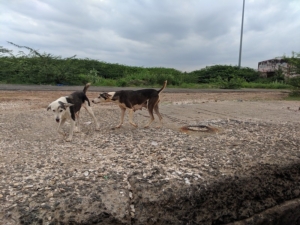Coconut Hounds: Caring for Stray Dogs in the Dominican Republic

From Puerto Rico to the Dominican Republic, stray dogs wander the streets of both urban and rural areas. While these dogs are laid-back, relaxed and rarely aggressive, they dominate entire neighborhoods. Tourists see stray dogs in the Dominican Republic, dubbed “Coconut Hounds” by locals, as a concern and a major problem.
Contrary to the fears of tourists, Coconut Hounds are friendly animals that have decent lives roaming the streets of urban areas, such as Santo Domingo. The pet culture of the Dominican Republic is dissimilar to that of other nations like the United States. While tourists believe these dogs are in danger and need help, organizations such as Dogs and Cats of the Dominican Republic ensure these pooches are well cared for. On the island, it is normal for pets to roam around during the day to visit friends or their favorite food spots and then return home to their owners at night.
How Stray Dogs Become an Issue
Despite Coconut Hounds’ friendly nature, stray dogs in the Dominican Republic are unfortunately impacting the tourism industry. With street dogs roaming around resort areas, websites such as Trip Advisor advise foreigners to not vacation in the Caribbean due to the unpleasant animal presence. As a result, the Dominican Republic loses millions of dollars as first-time visitors are told to avoid the island and returning tourists do not want to come back and see the strays.
As the economy takes a hit, the number of street dogs amplifies. Poverty directly links to more abandoned animals because owners lack the money to properly care for their pets. Not only can people in poverty not afford the supplies, food, shelter and health care for their pets, but underserved communities also have a lack of access to veterinary services and pet-care information.
Animal resource deserts appear in impoverished towns. Not only can owners not provide their pets with services to aid in their well-being, but there are also no veterinarians, spay and neuter clinics, groomers or supply stores. As impoverished individuals unable to care for their pets increasingly neglect their dogs, nations like the Dominican Republic face issues with their stray dog populations.
Dedication to Care, Dignity and Rescue
Fortunately, the organization Dogs and Cats of the Dominican Republic (DCDR) is making strides in providing Coconut Hounds with proper care. Managed entirely by volunteers, the non-profit runs programs in impoverished communities where animal neglect is prevalent.
To mitigate the effects of poverty on pet well-being, DCDR works with volunteer veterinarians who provide free medical services for both strays and dogs belonging to impoverished owners. Through spay and neuter clinics, the organization can prevent overpopulation and reduce the number of strays on the streets. Their outreach programs involve volunteers going into underserved neighborhoods and handing out tick, flea and parasite medication. While DCDR cannot house all the Coconut Hounds of the Dominican Republic in their shelter, they focus on providing vet services, such as x-rays and surgeries, to any dog in need.
Besides expanding the accessibility of animal well-being services, DCDR is also committed to educating impoverished individuals on proper pet care. The organization runs classes on proper treatment of pets, animal rights laws and what to do in an encounter with a stray. Along with providing pet owners with advice and information, DCDR also educates tourists on the pet culture of the island and encourages them to support stray dogs in the Dominican Republic by staying in hotels that embrace the animals.
Through the effort of the locals of the Dominican Republic, visitors and organizations like Dogs and Cats of the Dominican Republic, the beloved Coconut Hounds will continue to live happy lives on the island.
– Meilyn Farina
Photo: Flickr
